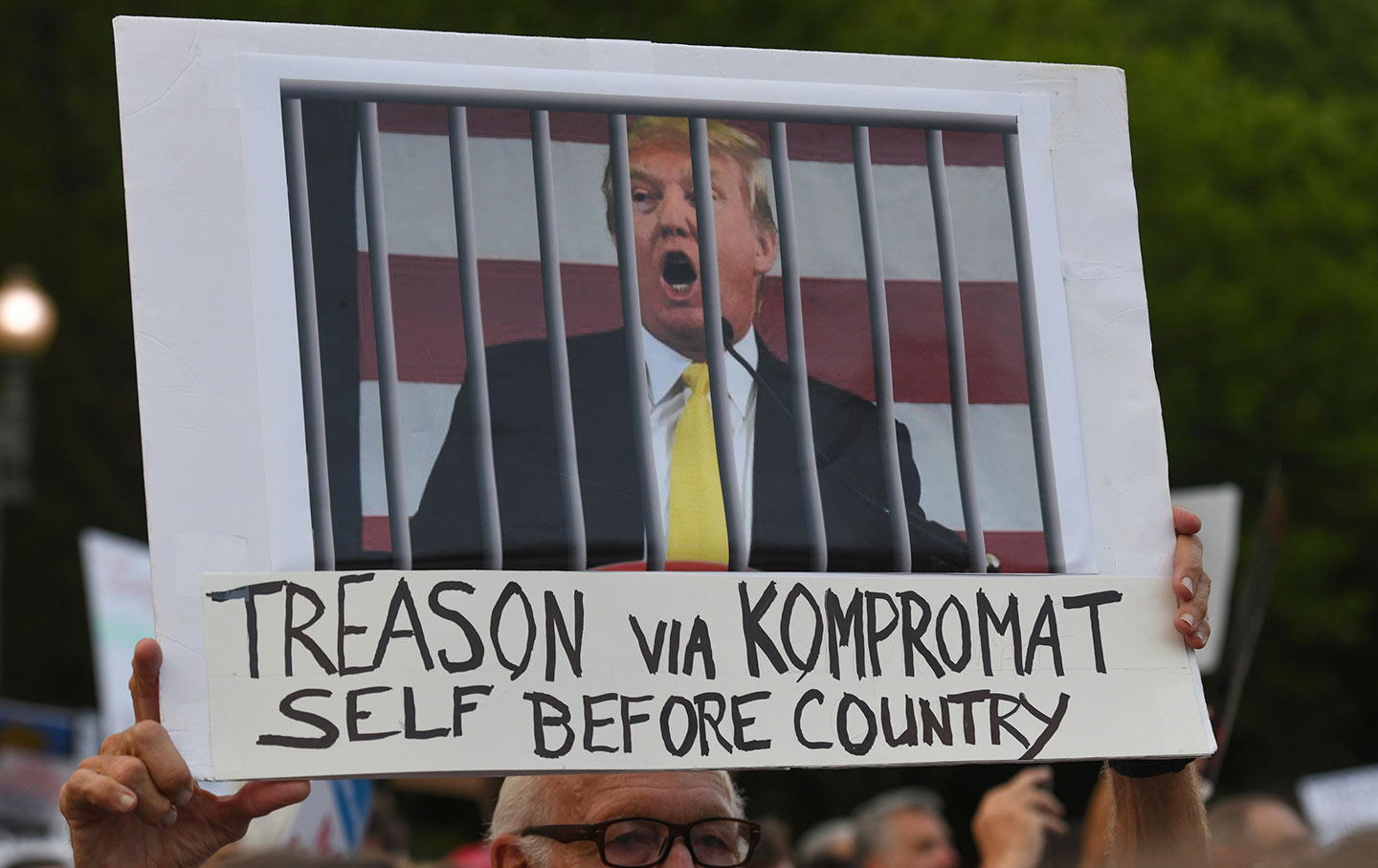
Protesters wave their signs in front of the White House in July of 2018.(Cal Sport Media via AP Images)
While the Mueller report has yet to be released, Attorney General William Barr’s four-page summary of the report’s findings assert that the special counsel’s investigation found evidence of Russian interference in the 2016 election but none of collusion between the Trump campaign and Russia.
Now that we are (one hopes) at the end of the two-and-a-half year Russiagate circus, a question perhaps worth turning to is: What effect has the media frenzy had on public opinion?
A timely new poll taken by the Chicago Council on Global Affairs and Russia’s respected, independent Levada Center sheds some light on the question. Not surprisingly, the key finding, said researchers in Washington on Monday, was that opinion in both countries reflects tense bilateral relations.
“The current period of tensions,” says the joint report, “is arguably the longest on record since the end of the Cold War.” Large majorities of Russians (85 percent) and Americans (78 percent) say the United States and Russia are “more rivals than partners.” In Russia, fully 78 percent of those polled believe their country’s foreign policy is the reason behind the decline in relations with the United States.
The number of Americans who see Russia as the country’s greatest foreign threat has risen over 20 percentage points from just two years ago.
To put that in perspective, in 2017, a plurality of Americans (59 percent) saw North Korea as the greatest foreign threat, as against those (18 percent) who feared Russia. Today, perhaps thanks to the opening of a dialogue between President Trump and North Korea’s Kim Jong-un, 39 percent of Americans view Russia as the biggest threat. The number who view North Korea as the country’s number-one threat has dropped dramatically to 21 percent.
There is a strong partisan element in these findings. According to the report, “Russian interference in the 2016 election has clearly impacted how Democrats view the US relationship with Russia.” While “two-thirds of Americans now believe that the Russian government tried to influence the 2016 presidential election,” the numbers split along party lines: 90 percent of Democrats and only 35 percent of Republicans believe there was Russian interference in the election. Large majorities of Democrats (83 percent) and Republicans (73 percent) view Russia as a rival.
One of the report’s notable findings is how the events of the past two years have affected Russians’ perspectives on China. In 2016, a Levada poll found that 34 percent of Russians viewed China favorably. In this latest report, Levada found that 84 percent of Russians now view China as “more a partner than a rival” as against 85 percent who view the United States more in terms of rivalry than partnership. The possibility of a deepening relationship between Russia and China has significant strategic implications for US foreign policy that are, perhaps, not yet adequately understood by those who have pushed for a new Cold War approach of isolating and punishing Russia as a response to the Ukraine crisis which began in early 2014.
Nadezhda Azhgihina, the Russian journalist and Director of PEN Moscow, observed in The Nation last week that Russian media commentators—“conservatives and liberals alike”—believe that “Russian-American dialogue is barely alive, and improvement in relations between the two countries is unlikely.”
As for Americans, the president of the Center for Citizen Initiatives, Sharon Tennison, recently observed, “In my 35 years of traveling throughout Russia, I’ve never before witnessed such a vast gap between what average Americans ‘believe’ about Russia and Russia’s reality on ground today.”
One possible avenue that remains amid the alarming militarization of US-Russian relations and the near collapse of diplomatic engagement and arms control agreements is a revival of citizen diplomacy.
Donald Trump’s cruel and chaotic second term is just getting started. In his first month back in office, Trump and his lackey Elon Musk (or is it the other way around?) have proven that nothing is safe from sacrifice at the altar of unchecked power and riches.
Only robust independent journalism can cut through the noise and offer clear-eyed reporting and analysis based on principle and conscience. That’s what The Nation has done for 160 years and that’s what we’re doing now.
Our independent journalism doesn’t allow injustice to go unnoticed or unchallenged—nor will we abandon hope for a better world. Our writers, editors, and fact-checkers are working relentlessly to keep you informed and empowered when so much of the media fails to do so out of credulity, fear, or fealty.
The Nation has seen unprecedented times before. We draw strength and guidance from our history of principled progressive journalism in times of crisis, and we are committed to continuing this legacy today.
We’re aiming to raise $25,000 during our Spring Fundraising Campaign to ensure that we have the resources to expose the oligarchs and profiteers attempting to loot our republic. Stand for bold independent journalism and donate to support The Nation today.
Onward,
Katrina vanden Heuvel
Editorial Director and Publisher, The Nation
Tennison’s center, which over the course of its 36-year history has played a critical role in promoting citizen diplomacy between the United States and Russia, is organizing a 17-day mission for 100 Americans that will visit a total of 30 Russian cities this fall.
In the meantime, Democratic presidential candidates and liberal pundits might consider directing part of their considerable energies toward defusing, rather than escalating, the new Cold War.
James CardenJames W. Carden is a contributing writer for foreign affairs at The Nation. He served as a policy adviser to the Special Representative for Intergovernmental Affairs and the Office of Russia Affairs at the US State Department.